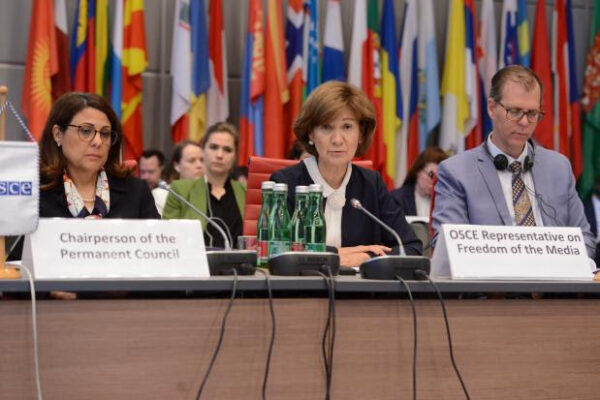OSCE Media Freedom Representative calls for enhanced efforts to protect media freedom, democracy and security
VIENNA, 13 June 2024 – “The failure to guarantee media freedom and healthy information spaces is increasingly disillusioning and disenfranchising people throughout the OSCE region,” stated OSCE Representative on Freedom of the Media (RFoM) Teresa Ribeiro in her address to OSCE participating States. Presenting her seventh and final bi-annual report to the Permanent Council, she highlighted escalating repression against the media and its detrimental impact on democratic principles and security across the OSCE region and urged States to bolster efforts to safeguard media freedom for the benefit of peace and security.
“In these challenging times, our dedication to the fundamental values of this organization is crucial,” the Representative emphasized. She echoed the Chairp-in-Office, Minister Ian Borg, who said that “what we do for peace today will help determine whether we live in war tomorrow.” Representative Ribeiro added: “We must stand up for media freedom now. There is no time for despair or inaction. Quality media and public interest information are essential to strengthen resilience, empower people, and protect democracy.”
Reporting on the period from November 2023, Ribeiro addressed the growing prevalence in various OSCE participating States of the false dichotomy of security versus media freedom. “Media freedom is an integral part of our security, not adverse to it. Restrictive approaches to fundamental freedoms and human rights in the context of today’s security concerns are alarming, reflecting an erosion of rule of law and growing authoritarianism. Sidelining human rights is always a shortsighted approach, one that transforms into a security concern itself.”
Next to discussing the increased political hostility towards independent journalism, the rise in violence and online attacks against journalists, and the use of technology to surveil journalists, Representative Ribeiro highlighted disruptions in the digital information landscape. “Concerns like media sustainability and online violence against journalists are exacerbated by disinformation, technological advancements and profit-driven business models of Big Tech. Today’s technology concentrates power unprecedentedly, and large language models, like social media, facilitate the exploitation of democratic liberties and openness,” she said.
Ending her address on a more hopeful note, Ribeiro cited some positive developments, including the Joint Statement on the Safety of Women Journalists and various national and regional initiatives. Ribeiro also introduced the concept of a Public Interest Framework, advocating for adding to the human rights framework a layer reflecting the collective societal level of public interest. “Healthy information spaces built on public interest are essential to guarantee media freedom, enable open debate, scrutinize those in power, and uphold rule-of-law-based democracies,” Ribeiro underlined. “States have a responsibility to advance media freedom for the benefit of democracy, for the benefit of peace and security. This includes the States’ responsibility to protect this unique mandate of the Representative on Freedom of the Media,” she concluded.
Please find the report here: Report by the OSCE Representative on Freedom of the Media, Ms. Teresa Ribeiro | OSCE
